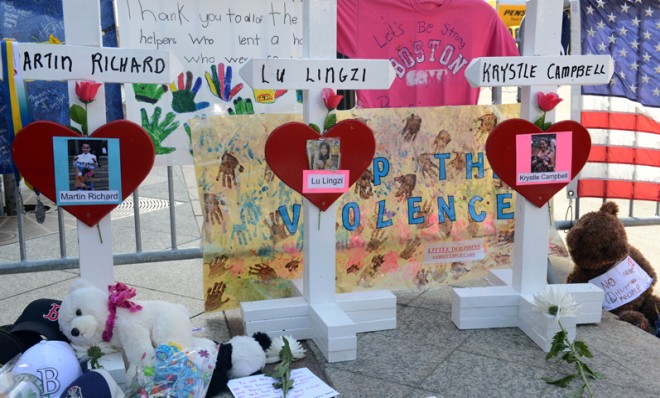Boston is a tragedy, but it's not your tragedy
The violence on Monday was sickening. But unless you were actually there, it could not have "almost" happened to you


A free daily email with the biggest news stories of the day – and the best features from TheWeek.com
You are now subscribed
Your newsletter sign-up was successful
To empathize with the victims of such tragedies as the Boston bombings is human and necessary. But one need not have been in clear and present danger to sufficiently grieve.
This week, for instance, a Washington radio station interviewed a marathon runner who "had run the Boston Marathon four times." The athlete said he didn't run this year, but the point made was inescapable — it could have been him.
Actually, no, it couldn't have. So why was he being interviewed?
The Week
Escape your echo chamber. Get the facts behind the news, plus analysis from multiple perspectives.

Sign up for The Week's Free Newsletters
From our morning news briefing to a weekly Good News Newsletter, get the best of The Week delivered directly to your inbox.
From our morning news briefing to a weekly Good News Newsletter, get the best of The Week delivered directly to your inbox.
This man offered not a scintilla of insight on the nature or cause of terrorism, nor of the psychological toll of surviving disaster. Just because someone has written "run the Boston Marathon" on their bucket list does not make this their tragedy.
The "me generation" seems unable to come to grips with this. I first noticed a weird crisis-envy in the years after 9/11. Initially, everyone seemed to know "someone who died that day." (Larry David famously parodied this on Curb Your Enthusiasm, when he pointed out that an associate who happened to be killed on 9/11 in unrelated circumstances wasn't "killed on 9/11.")
In the years that followed, it really wasn't enough to know someone who died. That's too distant; too clinical. In fact, while I was writing this very article, a guy at a restaurant table adjacent to mine was explaining how on 9/11, his flight out of Honolulu was delayed, but had it not been for that, he would have been on the flight that crashed into the Pentagon. I'm not sure of the time travel specifics necessary for such an airline connection to be made, nor of the new Pacific hub at National, but he was very eager for everyone to know that he — who was quite possibly in the safest city in the world on Sept. 11, 2001 — might possibly have been killed that day. It could have been him.
I'm willing to bet that I'm not the only person who's noticed just how many people now claim to have been scheduled for one of those four flights that day, and only narrowly escaped death. Those must have been the four most overbooked flights in aviation history.
A free daily email with the biggest news stories of the day – and the best features from TheWeek.com
There is a social media element to this, too. When the ill-fated "green revolution" swept through Iran, hundreds of thousands of people on Twitter colored their avatars green in solidarity, and like rats in a Skinner box, tapped the retweet button for everything they could find that was written in Persian. They reposted revolutionary slogans and reported the GPS coordinates of suppressive Iranian forces. All of this had the the effect of making soft Western liberals feel like they were part of the story. Oh, we need not have faced the gulag, but we were there, man. We almost saved Iran. In this and all matters, it was not enough to feel for the victims, or support them. We ourselves must be the story. We must reach victimhood. Our Facebook statuses demand it.
Likewise, there is a press angle. If al Qaeda had launched an attack on the so-called "homeland" — indeed, if al Qaeda were the ones responsible for the tragedy in Boston — and subsequently repeated endlessly the very same footage that cable news channels have spent the last four days looping, the United States would have launched a massive cyber attack against the originating server to stop these ghastly images from transmitting. But because these broadcasts appear in a window adjacent to Chris Matthews's head, the events in Boston are infused with and diminished by the artificial import that demands the same surface investment as this week's vote on American Idol.
No one among us needs to see the finish-line scaffolding engulfed in plumes of white smoke, nor that first runner fall to the ground —ball-bearing-shrapnel plunged into his femur — to understand the gravity of the situation, or appreciate the implications for personal safety at public gatherings. Nor do we need the name and face of the child slain in the attack to recognize that the indiscriminate slaughter of children is bad (or more importantly, is the modern reality). None of that is necessary to impart the urgency or import of the matter. But there it is, in high definition.
On Thursday, CNN spent a nontrivial percentage of airtime interviewing a responder to the Boston Marathon bombing. The scrolling chyron graphic wanted readers to know that the responder will never forget the images. No one should doubt that. But such information neither informs the public debate nor tells us anything particularly interesting about the responder, aside from the fact that he is a normal human being with normal human emotional reactions. CNN was broadcasting the most prurient and exploitative of terror porn. The news giant's mission wasn't illumination or information so much as merely seeking to somehow hold our interest in the tragedy.
But that's not necessary. CNN and its ilk on the upper channels of the cable box are like pornographers in Caligula's court. If the years after 9/11 are any indication, a few years from now, everyone we know will remember firsthand what it was like to cross the Boston Marathon finish line in 2013, to feel the concussive blast, and to only narrowly avoid the shrapnel radius of the terrorists' bombs. All that after missing our airline connection and narrowly surviving 9/11.
David W. Brown is coauthor of Deep State (John Wiley & Sons, 2013) and The Command (Wiley, 2012). He is a regular contributor to TheWeek.com, Vox, The Atlantic, and mental_floss. He can be found online here.
-
 The 8 best TV shows of the 1960s
The 8 best TV shows of the 1960sThe standout shows of this decade take viewers from outer space to the Wild West
-
 Microdramas are booming
Microdramas are boomingUnder the radar Scroll to watch a whole movie
-
 The Olympic timekeepers keeping the Games on track
The Olympic timekeepers keeping the Games on trackUnder the Radar Swiss watchmaking giant Omega has been at the finish line of every Olympic Games for nearly 100 years
